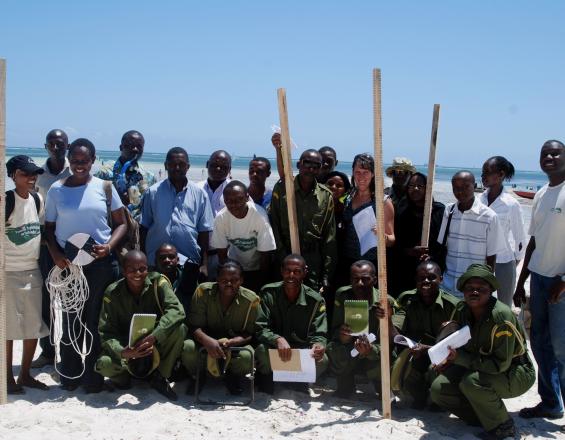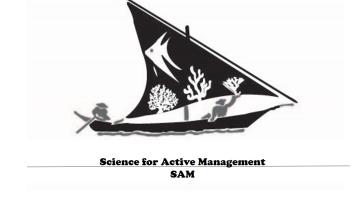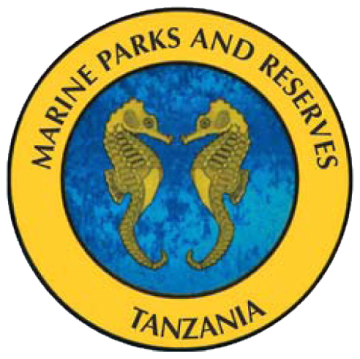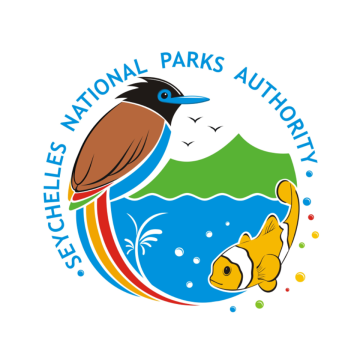
Strategic Adaptive Management of MPAs - towards inclusive and evidence-based MPA management

The Strategic Adaptive Management (SAM) approach is part of the SMART Seas Africa Network, and is applied by government agencies to develop evidence- and learning-based practices that increase MPA effectiveness. SAM builds capacity by (1) guiding staff in translating broad agency goals into measurable objectives, (2) engaging staff and stakeholders in MPA monitoring and (3) providing a framework to use data to inform and evaluate management actions. Managers and stakeholders think through what information is needed for evaluation, and researchers learn about management needs.
Context
Challenges addressed
Marine protected areas (MPAs) are essential to conserve marine biodiversity. Most nations have agreed to protect ≥10% of coastal zones by 2020. However, in the 2.8% of the ocean currently in MPAs, there are significant shortfalls in management effectiveness. MPAs require long-term management that is science-based and flexible to ensure that promised ecological and social benefits are achieved.
Location
Process
Summary of the process
- Capacity building helps managers and community understand the social-ecological system and prepares them for setting objectives and Monitoring.
- Objectives (with scientifically based targets) provide a framework that guides what data is needed to assess MPA status.
- Data can then be either accessed from existing data sets or requested from researchers in appropriate formats.
- Monthly monitoring augments existing data and increases manager and community understanding of what data means.
- Monthly review of status of objectives allows evaluation of where management action is needed. Then, in next months, effectiveness of actions can be assessed as each objective (and associated indicators) are tracked.
- Actions targeted at priorities (based on data) lead to conservation gains in areas most needing attention.
Building Blocks
Development of national SMART objectives
Managing without targeted objectives is like driving a car blindfolded. Objectives help determine how effective the current management is, which areas need active management, and whether actions taken contribute to moving the system toward objective targets. We develop a comprehensive suite of ecological and social indicators, have these prioritized by regional social and ecological scientists, and work with managers to independently prioritize indicators and develop objectives focused around each management goal. The final list includes manager and scientist priorities and is peer reviewed by stakeholders and regional scientists. Lists of objectives are flexible and updated often. Due to the lack of data or analytical capacity, we help them conduct a literature review, and establish ecological targets using baseline data (e.g., historical status or status within reference areas of long protected MPAs), non-linearity in large datasets (i.e., threshold levels at which ecosystem state changes), or established target levels (e.g., levels set by governments). For social state targets, we work with managers and stakeholders and use reference directions (improvement from existing state), or normative (value-based) targets.
Enabling factors
- Training in understanding marine and coastal ecosystems.
- Participatory process with managers, scientists, and community members.
- Agency support for use of objectives to guide management.
Lesson learned
Managers find the process of selecting objectives highly valuable and the targets help them understand status and guide decision making. However, the objectives need to be embraced by the agency, managers, and community to be effective and should be incorporated into national MPA management policy. Selecting management objectives requires that the managers and community understand the social-ecological system, so training may be required first.
Regular MPA monitoring
Managers and community members often have little training in marine and coastal ecological and social systems. Conducting monthly monitoring provides data about the system, but also provides a mechanism for managers to understand and witness changes in the system. Engaging community members in this process helps promote collaborative problem solving. Finally, this process helps managers better understand data they receive from scientists because they know what is involved in collecting data.
Enabling factors
- Training in understanding marine and coastal ecosystems.
- Participatory process with managers, scientists, and community members.
- Agency support for use of boats and equipment for monthly monitoring.
- Scientific oversight of monitoring methods and data entry/analysis.
Lesson learned
Collaborative monitoring of marine systems has been the single most effective component of the SAM program because it builds excitement for the marine system. Previously, many MPA managers and community members had few swimming skills and little knowledge of marine systems. Introducing them to monitoring has engaged many to dramatically increase swimming ability and participate. Further, the firsthand knowledge gained by doing the monitoring has increased understanding of challenges and willingness to find management solutions. However, data management is an on-going issue that needs scientific support and potentially data entry forms to help prevent mistakes.
Data request form
Scientific results and data are often published in formats that managers cannot access or find challenging to process and extract directly useful information (e.g. scientific publications). Once managers know what data they need to inform management (have thought through objectives and indicators), they can create a data request form asking researchers for the specific data most relevant to MPA management and in the format managers are using to allow rapid understanding and integration into existing databases.
Enabling factors
Training in understanding marine and coastal ecosystems. Managers know what data they need for management. Scientists are willing to share data (may require memorandum of understanding – as part of data request form – specifying how data will be used).
Lesson learned
Managers are frequently frustrated by lack of access to data collected in their MPAs. Scientists often do provide data, but in formats not preferred by managers. We surveyed MPA managers from 8 nations to determine how they would like to receive data from managers, then helped them develop data request forms reflecting their needs, and in the units that they understand. Researchers have expressed willingness to complete these forms, especially when they contain an memorandum of understanding indicating that data will be used for management and not in publications or presentations without prior consent and acknowledgements. This has increased access of data by managers.
Peer Training
We recognized the need to build leadership for effective MPA management from within, and ownership and leadership of the approaches co-developed.
We convened a group of 18 regional and global experts to train the most engaged MPA practitioners across 3 nations as peer trainers in evidence-based (adaptive) management. The expert team first broke down adaptive management into 3 core components: marine monitoring, data summarization and management, and strategic decision making. We then invited applications from MPA staff and engaged community members in 3 national MPA systems (Kenya, Tanzania, and Seychelles) to become peer trainers in one of the areas, as we recognized that no one staff could likely train in all three.
We received 60 applications and invited 30 MPA members to participate in the peer trainer training in Seychelles in August 2019. We developed a 5-day training course. We did 2-days of joint sessions, then each group had 3-days in their individual core areas. The final day was testing in the core concepts. Of the 30 practitioners who participated, 11 passed as peer trainers or assistant peer trainers.
These peer trainers are now working in their respective nations to continue improving MPA management.
Enabling factors
Existing leaders in the approaches through past in-country training events willing to become peer trainers.
Willingness of experts to volunteer their time to develop and lead the training.
Lesson learned
Building ownership and leadership is key.
5-days probably not enough time for a peer trainer course - ideally, there would be three 5-day courses with time to practice skills in between, but this requires more funding than was available.
Resources
Impacts
The application of the SAM approach has led to innovative conservation solutions, by bridging science and MPA management. Demonstrated impacts include:
- Increased management capacity and passion for conservation among MPA staff and local community members.
- Removal of invasive species and clean beaches maintained (management actions).
- Enhanced sharing of information between scientists and managers.
Beneficiaries
Government agencies, local communities (fishermen, beach vendors, tour operators) and society (through enhanced delivery of ecosystem services).
Story

In 2009, we established SAM (Science for Active Management) with the Kenya Wildlife Service to help East African MPA managers and local fishers understand and manage their reefs. When the program started in a single Kenyan MPA, managers had a very low understanding of marine systems, and one MPA had lost many corals. Fishers felt disengaged from MPA management and were not actively managing their fishing grounds. Most people working on the beaches had no knowledge of marine ecosystems. Through SAM, managers, fishers, and beach stakeholders received training in marine ecological and social systems and learned to conduct scientifically sound monitoring. MPA managers and fishers were guided through the process of developing measurable social and ecological objectives for marine systems. MPA rangers (with stakeholders) then started monthly social and ecological monitoring to document changes in the system as they occur. The results of using science to empower communities have exceeded expectations. Prior to SAM, the MPA social system felt apathetic. Now, you can feel the excitement when entering an MPA. For five years, rangers have been collecting and analyzing data, and findings are comparable to those of experienced researchers. Rangers now train their peers in monitoring and management techniques, and have taken major management actions: invasive species were removed from MPA beaches to enhance turtle nesting, corals damaged by fishing are being restored with help from fishers, and the public beaches that were covered in plastic trash for decades are clean. These efforts have had impact beyond the MPA: the county government has made plastic-free beaches a priority, and locals are proud of their environment. Over 550 people attended a recent beach cleanup, including police forces, hoteliers, beach vendors, and the Minister of Tourism. Fishers and Kenya Wildlife Service rangers jointly explored levels of fish spillover from MPAs. Beach vendors have become MPA ambassadors, resulting in an increase in domestic tourism to MPAs. “MPA Champions” have surfaced from all sectors. For example, Champion Pascal Yaa is a fisher who keeps meticulous records of coral damage in fishing grounds and now serves as a peer trainer for fishers in best practices.











